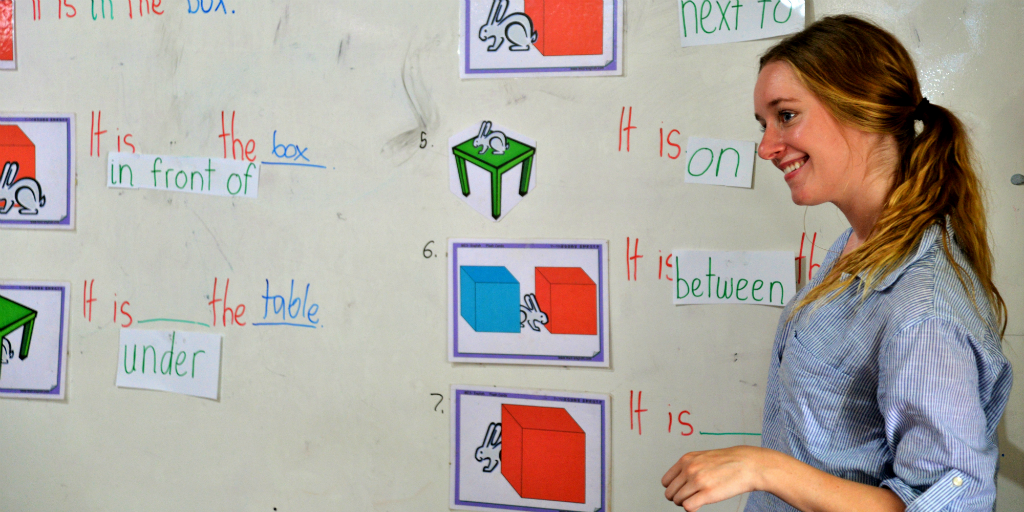Discover the importance of gender equality in development. Learn how to support women's empowerment through volunteering with GVI. Read more now.
Petrina Darrah
Posted: May 13, 2023

Posted: July 22, 2020
Are you eager to have a go at language learning, but weary of losing interest? Luckily, there are ways to learn a new language that are also tons of fun.
Do you remember feeling excited about starting language-learning classes in the past, but don’t remember what made you stop – or never start at all? The reason for this may be because these classes couldn’t capture – or keep – your attention.
Regardless of the specific language you’re trying to learn, these ten helpful tips will make the process more engaging, even easier, and a lot more enjoyable.
Duolingo is a free language-learning application (app) that you can download on your phone, or personal computer. It’s not only a great way to brush up on more than 30 different languages at your own speed, but it’s also an engaging way to learn.
This is because you’ll be reminded about daily lessons and supported through each class by an adorable study buddy – known as the Duolingo owl.
Cuteness factor aside, the set-up of the app makes it an easy way to practise the vocabulary, grammar, and idioms that are an essential part of learning a new language.
Duolingo is a great start to language learning because of the following:

Original photo: “TV Man” by mohamed Hassan is licensed under CC BY-SA 2.0
Get comfy on a couch, put on a film, and prepare to practise your language-learning skills.
Watching movies with subtitles in the language you’re trying to learn is a great way to mix in some entertainment with your learning experience.
This is partially how I learned French in college, and it gave me a glimpse into many different aspects of French society.
Visit a library and check out a book written in the language you want to learn.
It may be best to start with one that’s also available in English, so that you can get the general idea of what’s going on. Or, if you’re feeling daring, check out a classic – like Madame Bovary – and get a foreign-language feel for an age-old favourite.
There are tons of language-learning video clips floating around YouTube. These can help you with pronunciation, and serve as listening exercises that get your ears primed and your tongue trained.
Language-learning videos can be especially useful when learning a tonal language, which can be difficult to pick up on through text only.
When I was learning Thai, I scanned through YouTube’s offerings and was able to find some very helpful tutorials that made learning so much simpler.

Write down several common phrases that you could see yourself saying during a typical day. Things like, “How are you?” and “How much for the ride?” are commonly used phrases in most languages, and can be useful while travelling.
Put these phrases on sticky-notes and place them around your house, in areas you often find yourself in. For example, you could put some up on the refrigerator, or around the mirror in your bathroom.
This way you can read over them frequently and get into the habit of practising these phrases regularly.
You can also pretend that you’re rehearsing for a play and act them out if you want to get in even more practise.
After a while you’ll be able to memorise these phrases, and they’ll be ready to use when you travel abroad.
And, once you’ve reached your destination abroad, you can rehearse in different scenarios that you experience in your day-to-day activities. This way, you can fine tune your responses, and become more confident when speaking to local people.
Eventually, speaking the language will become second nature.

Are you planning to visit, study, or work in a country that speaks the language you are learning?
While these are all great options, a language immersion trip is even better, because it makes learning a new language a top priority.
And even if you can’t go abroad right now, you can still plan a trip for the future.
Research different countries that speak the language you’re interested in, get to know more about the culture, and figure out which destinations offer the type of experience you’re looking for.
The more enthusiastic you become about that country, the more encouraged you’ll be to continue to learn the language – and hopefully, one day visit and speak to local people in their native language.
Doing anything with a friend makes it way more enjoyable. The more fun you’re having, the more likely you are to actually follow through with your goals instead of procrastinating.
So, team up with a pal who also wants to learn the language and set goals for yourselves.
Make it a team effort, and cheer each other on!
Build on tip seven by taking some of those friendly vibes and turning them into a friendly competition.
Make a deal with your friends that whoever loses the language-learning challenge has to treat the winner to some kind of prize.

Choose a country that speaks the language you want to learn, and pick one of their cultural dishes.
Write the ingredients and instructions out in the native language, and try your hand at the culinary craft.
Keep a cheat sheet nearby with translations, in case things get a little sticky mid-way.
It may sound cliche, but it’s true; practise makes perfect.
Take every opportunity to perfect the language you’re learning. Think in the language, create mock interactions, or pretend that you can’t speak English for a day.
While you learn a new language, the key is to find as many ways to practice as possible. Making little games for yourself can make language learning so much more interesting.
Remember these tips for making language learning fun when you set out to learn your next language (or two), and you’ll be a language-learning pro in no time.
Find out more about GVI’s international, award-winning volunteering programs and internships, and take on language learning while travelling abroad.
Discover the importance of gender equality in development. Learn how to support women's empowerment through volunteering with GVI. Read more now.
Petrina Darrah
Posted: May 13, 2023